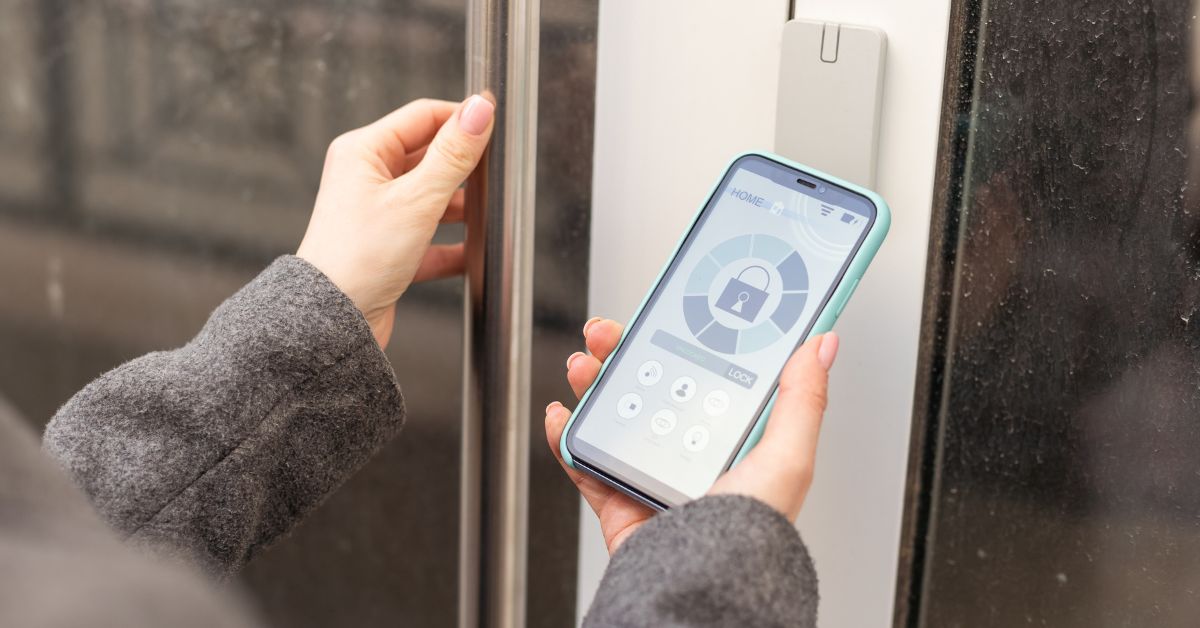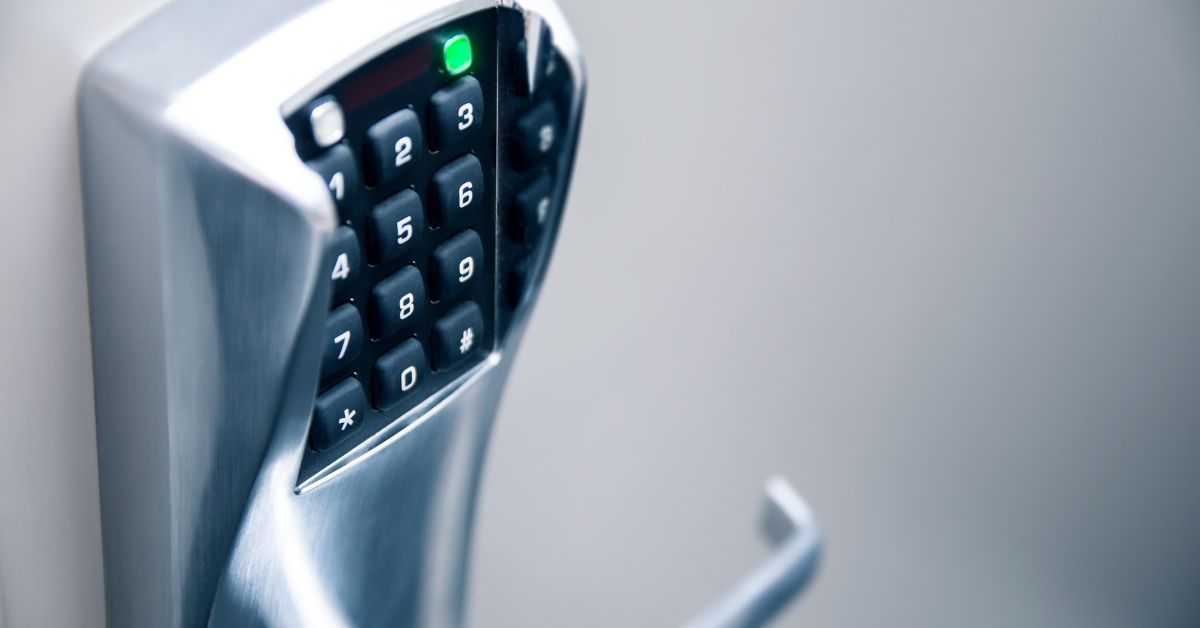Smart Locks vs. Electronic Locks: What’s the Difference?

When it comes to securing a commercial property, choosing the right locking system is critical. With advancements in technology, traditional locks are being replaced by smarter, more versatile solutions like electronic locks and smart locks. But what’s the difference between the two, and which one is better suited for your building’s needs?
If you’ve been debating whether to install smart or electronic locks, you’re in the right place. This guide will cut through the marketing hype and break down the key differences, features, and benefits of each type of lock. We’ll give you all the information you need to choose the best solution for your property. By the time you read the last word, you’ll have a clear understanding of which lock is right for your property.
What Are Electronic Locks?
Electronic door locks are a step up from traditional mechanical locks. Unlike a standard deadbolt lock operated by a physical key, electronic locks use an electrical current to control locking and unlocking mechanisms. They’ve gained traction in commercial and industrial sectors because they deliver solid security without the complexity or price tag of more advanced systems.
Key Features of Electronic Locks
Electronic locks are superior to conventional mechanical systems in both security and functionality. Unlike standard deadbolt locks that rely on physical keys, electronic locks rely on an electrical current to manage the locking and unlocking process. This innovative design eliminates the need for conventional keys, offering a modern, efficient solution for securing doors. Without traditional keys and locks that can be replicated or picked, it becomes much more challenging for outsiders to breach your property.

By optimizing convenience and providing high-tech security features, electronic locks are a modern solution for properties of all sizes. Electronic locks simplify access while offering additional functionalities like remote control and keyless entry.
What Are Smart Locks?
By incorporating advanced connectivity features, smart locks take electronic locks to the next level. While they share some basic functionality with electronic locks, including keyless entry, smart locks provide additional control through technology like Wi-Fi, Bluetooth, or Z-Wave. These aren’t just locks; they’re command centers for your entire access system, built for people who manage multiple facilities or need to control access remotely without driving across town.
Key Features of Smart Locks
Essentially, smart locks represent the evolution of electronic locks. With technologies like Bluetooth and Wi-Fi, smart locks allow users to monitor access remotely using smartphones or other connected devices. Plus, they offer maximum flexibility and control for a wide variety of applications.
These systems aren’t just for tech-hungry early adopters anymore. They’ve become essential tools for anyone serious about balancing security with accessibility. Their advanced features make them a practical and modern solution for securing properties of all sizes and types.
Comparing Smart Locks and Electronic Locks
Now that you understand the basics of these two types of locks, you’re probably wondering how they compare to each other. Follow along to take a closer look at the key differences between electronic locks and smart locks.
Connectivity and Control
Electronic locks offer local control only, so you won’t be able to manage the system remotely. Instead, you must update codes or provide access in person when using electronic locks.
On the other hand, smart locks boast enhancing connectivity that allows for remote access and integration with other systems. If you’re regularly away from your property or if you manage multiple properties, smart locks are a convenient, reliable choice.
Ease of Installation
Electronic locks are typically easier to install, especially in retrofitting existing doors. Most don’t require internet connectivity, which simplifies the setup process.
For smart locks, installation tends to be a more complex process. This is especially true if they’re integrated into larger systems. However, many smart locks come with DIY-friendly installation options.
Cost
Electronic locks are often more affordable upfront, with fewer ongoing costs related to software updates or connectivity.
On the other hand, smart locks have a higher initial investment due to their advanced features. The ROI comes not just from security, but from operational efficiency and reduced management overhead that everyone will appreciate.
Access Flexibility
Electronic locks are limited to PIN codes and keypads, offering basic control. If you’re looking for more flexibility, smart locks have options for remote control and access logs.
Best Use Cases
Electronic locks work best for smaller offices or retail spaces where simple, affordable security is the priority.
For multi-location operations, properties needing advanced access customization, or situations where remote control adds significant value, smart locks are the ideal choice.
Key Considerations When Choosing the Right Lock
Both smart locks and electronic locks can significantly improve the security and convenience of your property. However, the best option depends on your specific needs. Here are some factors to keep in mind.
Security Level
How sensitive is the property you’re protecting? High-value assets or sensitive data may require the more advanced capabilities of smart locks.
Budget
If you’re concerned about the cost, electronic locks provide many features at a lower price. Just remember to weigh the upfront costs against the long-term benefits.
Access Requirements
Consider your access turnover rate. If you require frequent updates to access credentials, smart locks offer easier management through remote updates.
Connectivity Infrastructure
Does your building have reliable Wi-Fi? Smart locks depend on consistent connectivity for optimal performance, so they’ll cause unnecessary headaches for properties with a spotty connection.
Scalability
Make sure to consider your future needs. Are you planning to expand your facilities or workforce? Smart locks offer better scalability.

Why You Should Care About the Right Locking System
Your choice of locking system isn’t just a security decision; it’s an operational one. From safeguarding valuable assets to streamlining day-to-day management, investing in the right solution offers peace of mind and long-term savings.
By understanding the difference between smart locks and electronic locks, you’re better positioned to make informed decisions. Whether you prioritize basic functionality or cutting-edge technology, there’s a locking solution tailored to your needs.
Which Lock Should You Choose?
There’s no one-size-fits-all answer when deciding between smart and electronic locks. Consider your specific needs, budget, and operational complexity to find the right fit. Choose electronic locks for budget-friendly, straightforward security solutions with minimal maintenance. For advanced connectivity, remote access, and data-driven insights, opt for smart locks.
Armed with the real differences between electronic locks and smart locks, you can make an informed decision for your property. Remember that both options provide significant improvements over traditional locks, making your property safer and easier to manage.
Ready to upgrade your facility’s security game? Head over to DoorHub to check out our commercial-grade electronic and smart lock systems that can handle whatever your project demands.

Author
Michael Rega
Chief Marketing Officer and founding Member of DoorHub.com